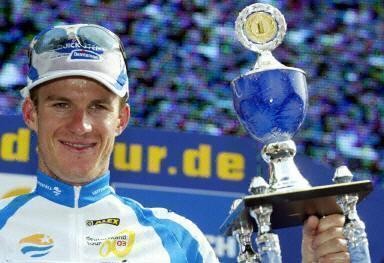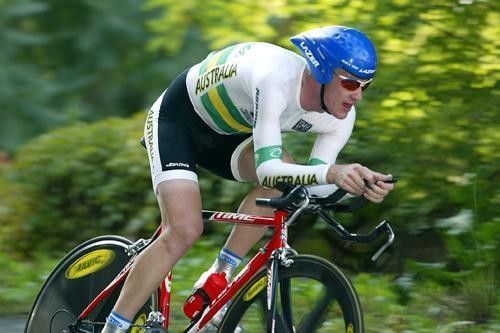Michael Rogers - a baptism of tire
Australian cyclist Michael Rogers (Quick-Step - Davitamon), who recently won both the 2003...


Tales from the peloton, January 13, 2004
Australian cyclist Michael Rogers (Quick-Step - Davitamon), who recently won both the 2003 Australian Cyclist of the Year and the Ride Cycling Review Men's Road Cyclist of the Year awards, writes about his experiences at the 2003 World Road Cycling Championships, where he won the silver medal in the individual time trial.
In this article from the latest issue of Ride*, Rogers describes how he lifted himself for one final effort for the season - a season where he won three stage races and completed his first Tour de France - and changed his riding style after his experiences at le Tour.
There's no doubt I'm passionate about the time trial but the worlds seemed unlikely this year because it had already been such a long season. Only about two weeks before I was scheduled to fly to Canada, I contemplated surrendering my place on the national team because I just didn't think I was ready. There's nothing worse than going to a race where you're expected to perform and all you do is creep. And when the race is the world championships, that sensation is exaggerated. After I overcame my initial hesitation, however, I found that my form slowly reached a level where something was possible.
Once I arrived in Hamilton the best thing I did was ignore the reality of why I was there. Instead of reminding myself that this was the worlds, I treated it like just another race in a long season. And although that's all it really is, I still get nervous before an event like this.
This year has been a real baptism for me. While I've ridden every world championship in the past six years with the exception of 1998 - because I was concentrating on the Commonwealth Games - nothing could prepare me for what I experienced at the Tour de France. I survived those three weeks, but life is different after riding the Tour. As well as getting a better understanding of what cycling at the highest level is all about, I also learned a lot about my body. And because of this we started experimenting with my time trial technique.
In the past, I've probably been riding gears that are too big for me. The normal tactic was to start a time trial fast, drop the chain down to the 11 and grind the day away. I used to go along in the 54x11, and that was the same gear I always raced a time trial with. Now I'm working on lifting the rate of my cadence and I try to change gears a bit more. I concentrate on trying to hold the same speed, but with my chain two cogs higher on the cluster.
Get The Leadout Newsletter
The latest race content, interviews, features, reviews and expert buying guides, direct to your inbox!
I don't think I'll quite get to the point of what Armstrong is able to do, but over time I think pushing a slightly smaller gear helps to save your muscles a bit. In the last couple of days of the Tour my legs were like jelly; I was so tired that I had trouble turning the pedals. This sort of fatigue was the result of three weeks of hard racing on gears that perhaps weren't always appropriate. I used to arrive at the bottom of every climb in a time trial going full throttle. Now I try to back it off a little in the lead-up to the rises. It gives me a bit of respite and allows me to push over the climbs with more force. After all, this is where you lose the most time. Climbing was a lot easier in Hamilton because of the work we did after the Tour.
The time trial is all about being as prepared as possible. The race itself should really be done on auto pilot but to do that, you have to be both confident and comfortable. I know I was more relaxed this year and also happier with my pedalling action. The only other difference from when I finished eighth at last year's championship was to have the front of my body a little higher. My position last year may not have looked low, but it was severe. I was primarily thinking about aerodynamics; this year I have considered my physique. When I'm tucked down low it's not so easy to breathe. I have big lungs and the way I sat didn't allow me to get as much air into my body. It's a compromise. I lose a little bit of the aero advantage, but it's worth it because I can now suck in a lot more air.
There were plenty of changes to my approach to this year's race. They were minor alterations but they came about because of experience. Mentally I was far more relaxed, physically I was more mature and technically I believe things were more efficient. I put all my energy into the final three days of preparation and made sure everything was right for the race. And all these things made a difference to the result. Instead of racing for a top 10, I wanted to finish on the podium.
The day before the time trial I had a final hit-out on the course, riding behind the team car with Brian Stephens advising me on where and when I should rest - and at exactly what points of the course I had to give it everything. I was as ready as I was ever going to be.
I didn't take any big risks during the ride and I felt like I was setting a good time. Since I've come to Europe, one of my main rivals has been Fabian Cancellara of Switzerland. He became a sort of nemesis for me because we often had the top two places in time trials… but he usually had first and I would take second. In Canada, he started one place ahead of me but I never thought about catching him. I just wanted to ride my own race. Then, just as I caught him - and had achieved a victory of sorts - I punctured.
I had an agreement with our mechanic that if I had a flat tyre in the final 10km, I would take a new bike rather than fuss around with a wheel change. My puncture happened with eight kilometres to go so Greg (Boorer) knew what he had to do. Unfortunately, the roof racks supplied by the organisers weren't the best. The bike stuck and it felt like I was waiting on the side of the road for about 10 minutes. I've done the maths since and I think it was really only about 40 seconds before I was back up to full speed, but at the time it felt like an eternity. I know not to panic in these situations and I'm thankful I didn't because another second of panic would have seen me finish third instead of second. Every second and every lesson, it does count at this level.
Michael Rogers
mickrogers.com.au
*This article appears in the latest issue (#23) of Ride Cycling Review. To subscribe online, click here.